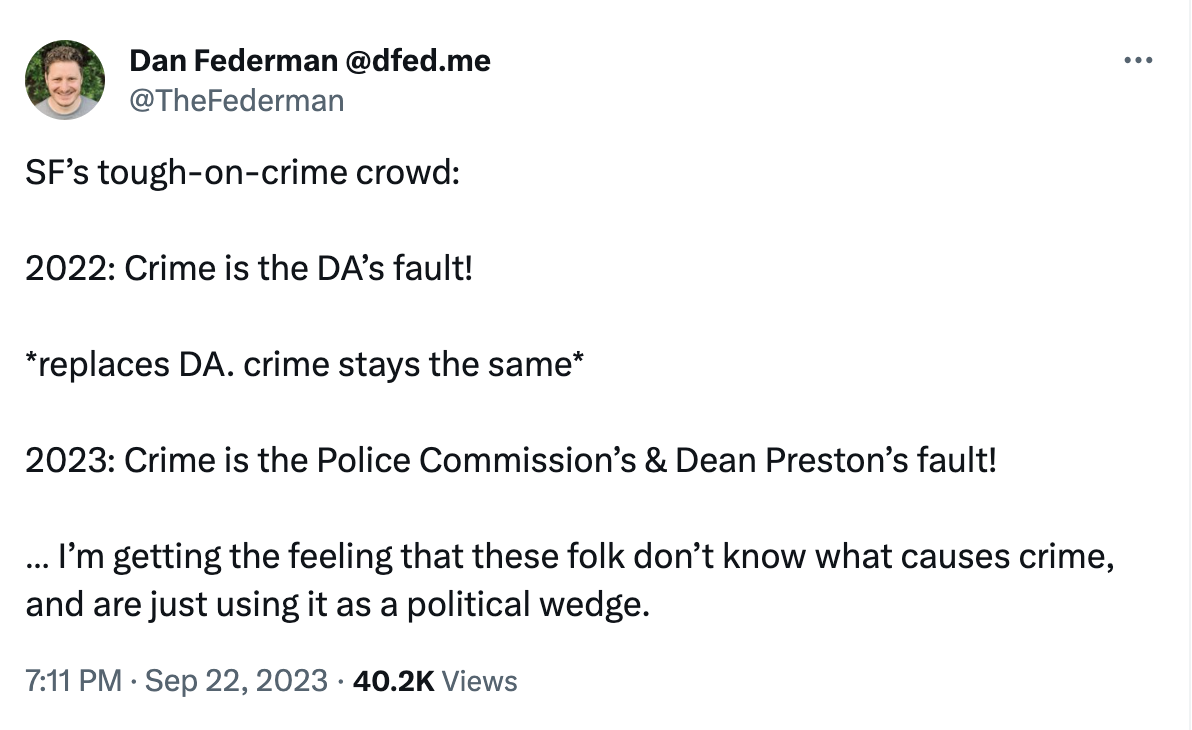San Fransisco’s Crime Problem is Really an Empathy Problem
There is this steady drumbeat of growth focused residents, especially techies (who rail at any opposing views which they term as ‘degrowth’), of San Fransisco who suggest that crime has exponentially increased in the city. Don’t get me wrong, low crime is a desire that we should all have and an ideal we should all work toward. But the truth is that the overall violent crime rate in SF was lower in 2022 than it was in 2019 pre-pandemic and, even as it rises now, the solution is not the wholesale removal of leadership that these techies claim are useless and in cahoots with the criminals in some cases. Before we can talk about how to reduce crime we have to talk about homelessness in San Francisco.
Property prices increased in San Francisco 40% in one year (compared to the average U.S. home's 18.6% gain). The median property price increased to $590,000 in June 2021 and continued to climb throughout 2021 and 2022, reaching $670,000 in May of 2022.
“In the San Francisco metro area, home values rose significantly as well: From March 2020 through a high at the end of June 2022, the area’s median home value increased from about $913,000 to over $1.2 million, a 34% increase.
Two big reasons for why the homes prices have risen; i) a disparity between how many homes are available for sale (supply) and the number of people looking for homes (demand) ii) income inequality. What this leads to is an unusually high rate of homelessness in one of richest cities in the world. 0.54% of the population in SF are considered homeless and unsheltered. In regular people speak, ~4400 residents of San Francisco do not have a roof over their heads. And this is the crux of the problem.
In the research paper Multivariable modelling of factors associated with criminal convictions among people experiencing homelessness and serious mental illness: a multi-year study by Milad Parpouchi, Akm Moniruzzaman, Jane A. Buxton, & Julian M. Somers, the researchers show that people experiencing homelessness and serious mental illness exhibit high rates of criminal justice system involvement. The researchers studied 425 homeless adults with serious mental illness in Vancouver. Data were analyzed over a 5-year period using administrative records. 48.5% of the participants had at least one criminal conviction during the study period. The most common offenses were property crimes and breach of court orders. Significant risk factors for criminal convictions included younger age, being male, drug dependence, irregular social assistance payments, prior convictions, and psychiatric hospitalizations. The study findings highlight the importance of poverty, social marginalization, mental health crises, and the need for long-term recovery-oriented services to reduce criminal convictions in this population. Again, in layman’s speak, if we address the homelessness and mental health issues we will directly impact the crime issues. The authors concluded that supported housing programs like Housing First in Vancouver, which provide comprehensive health and social services, may help reduce convictions among homeless people with mental illness.
The tweet (image and link) above gets at the crux of the issue with the crowd who think this is purely about crime and punishment. In a city that has 84 Billionaires and in a metro area that has 285k millionaires, more people sleep on the streets than anywhere else in the US. And this is what the techies in SF seem to be intentionally missing; homelessness and mental illness have a high correlation with crime. I have walked the streets of SF and paraphernalia of drug use and symptoms of mental illness are clearly apparent everywhere you go where you see unsheltered people. For a cohort keen to tout how much data drives their decision-making, there is a lot of emotion-driven rhetoric by the tech community about the collapse and urban decay that is (in their own estimation) crushing SF. The feigned ignorance might be the point. The more we pretend we are not part of the reason for a problem, the less responsibility we can place on ourselves to help address it. Right now we’re pretending the government officials are the bogeywo/men. Unfortunately, the bogeywo/men is us. Until we look in the mirror, we will not feel the empathy required to address this problem. We’re wasting time.



